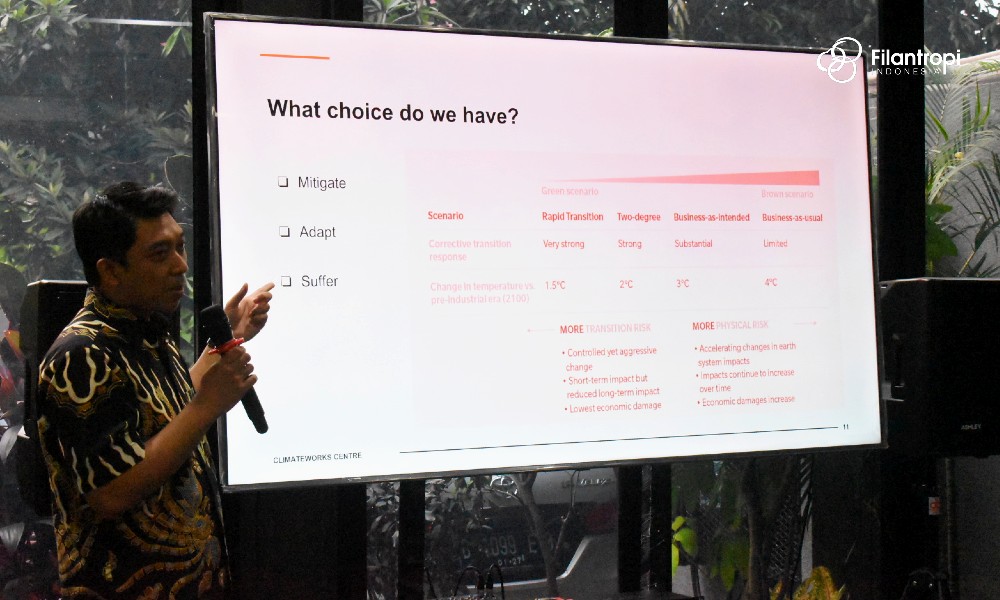Putting Philanthropies At The Centre Of Climate Change Knowledge Transfer

The Intergovernmental Panel on Climate Change (IPCC) has recently published the Synthesis Report to the Sixth Assessment Report. The report warns that global warming this century has reached 1.1°C and is on the course to exceed the 1.5°C limit without a drastic reduction in greenhouse gas emissions. The impact of climate change has already been seen and often hit the most vulnerable communities.
Indonesians are increasingly concerned about climate change, but the uneven knowledge dissemination across the country has hindered some climate mitigation and adaptation efforts. Knowledge transfer activities need to be well executed to complement the Indonesian government’s overarching climate change regulatory framework, such as the updated Nationally Determined Contribution (NDC) target and a net zero pathway for 2045 produced by the National Planning Agency (BAPPENAS).
On the other hand, research by the Yale Program on Climate Change Communication indicated that two-thirds of 1,178 Indonesian respondents claimed they knew little or had never heard of climate change.
This leads to whether or not crucial stakeholders such as corporations, foundations, and philanthropies of Indonesia have a deep understanding of climate-related risks. Being a champion of climate action is not easy; it requires a thorough grasp of the people’s worldview and climate alignment to their daily lives.
Philanthropies and foundations are among the key stakeholder groups that can amplify the message of climate-related risks. Philanthropists play a vital role in the world’s response to climate change by targeting specific geographies, industries, and solutions that most need support and thus have the power to influence climate system change.
Indonesia’s philanthropy landscape is unique and closely linked to its social and cultural aspects. In recent years, institutional philanthropy in Indonesia has been trying to align its work with Sustainable Development Goals (SDGs) issues, including environmental and climate change causes. Yet only 19% of philanthropies in Indonesia pursue a climate-related program, most of which support health and education, based on Indonesia Philanthropy 2022.

“The recent IPCC report makes clear that we need immediate and real actions to have any change on reducing the climate crisis. One of the ways is to strengthen regulation that will push significant breakthroughs,” said Riki Frindos, Executive Director of KEHATI Foundation.
“Philanthropic institutions need to prioritize programs and activities related to the climate crisis and take a role in overcoming the impacts of climate change,” added Guntur Sutiyono, Indonesia Country Lead of Climateworks Center.

Philanthropies must be a part of the climate momentum and build knowledge around what climate change is, what climate risks they face, and the relevance of climate change to their existing programs.
One of the Indonesian philanthropic networks, Perhimpunan Filantropi Indonesia, understands the climate urgency resulting in establishing an Environmental and Conservation Philanthropic Cluster as an anchor for climate mitigation and adaptation activities. The group has accommodated foundations’ capacity-building needs for leveraging climate action collaborations among its members.
“The environment and conservation philanthropic cluster has actively promoted philanthropic institution involvement to address environmental issues. We also provide discussion forums for environmental activists to provide ideas for environmental conservation. Activities such as capacity building and technical assistance for the institution’s staff on climate change knowledge have been carried out and will be carried out periodically”, said Dr. Dolly Priatna, Executive Director of Belantara Foundation and Coordinator of Filantropi Indonesia’s Environment and Conservation Cluster.

Philanthropies believe that creating space for open dialogues will enhance the opportunity for the cluster’s members to develop resources and mutual understanding around their vision for climate actions.
Climate change is a cross-cutting issue. Internalizing climate-related strategy is critical to safeguard philanthropy’s support in environmental or conservation and other areas such as health, education, empowerment of marginalized groups, and local economic development. Achieving this shared goal requires the participation of all stakeholders by pursuing multi-stakeholder co-creation and collaborations to accelerate it. In these Decades of Action, collective action is essential to be the driving force between stakeholders to complement each other’s resources and accelerate the achievement of a common agenda related to climate change.

